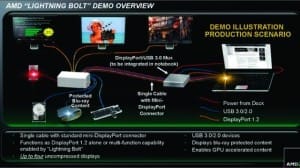AMD’s desired but seldom seen DockPort has gotten a new lease on life – Tuesday at CES, AMD, Texas Instruments, and the Video Electronics Standards Association (VESA) announced that AMD’s DockPort has officially been rolled into an extension of the DisplayPort standard.

Thanks in part to the cost of the interface, Apple is the only major OEM that has made Thunderbolt support a priority, with all five of their computer lines having at least one Thunderbolt port. AMD expected cost to be an issue when they designed Lightning Bolt, and as a result, it uses the standardized interfaces of USB 3.0 and Displayport, which are standardized, require no royalty payments, and do not require discrete controller chips on both devices, all interaction is managed by a single DockPort controller chip. Because all data connections are USB, there should be little problem with hot-swapping, something that is a problem with Thunderbolt in Windows because it uses PCI-Express. Linux support should also be out of the box, where Thunderbolt is barely functional.
Perhaps most importantly, however, Dockport was made to provide power in addition to data connectivity. With DockPort, single-cable solutions will be a reality. Thunderbolt’s lack of power means even high-end solutions like Apple’s Thunderbolt display have to either provide a power solution or have the user bring their own. In addition to laptops, this can also be used for conventional Android and Windows tablets, as well as being a potential win for projects like Canonical’s Ubuntu phone, which aims to allow users to plug their phones into a dock and have the full Ubuntu experience on a keyboard, mouse, and monitor.
According to Wes Ray, a systems and applications manager for Consumer and Computing Interface at TI, “As an open standard, DockPort will be readily available for designers to implement and more quickly deliver the convenience of a single connection in devices such as tablets, notebooks, docking stations and dongles.”
The press release from VESA says that they expect all testing and specification publication to be final in Q2 2014. Thunderbolt hasn’t seen much success due to the cost and proprietary chips, but Dockport has the very large advantages of being open, royalty free, and less of a headache to implement.
VESA’s press release can be found in its entirety here: http://www.vesa.org/featured-articles/displayport-adds-dockport-extension-to-royalty-free-vesa-stan…






